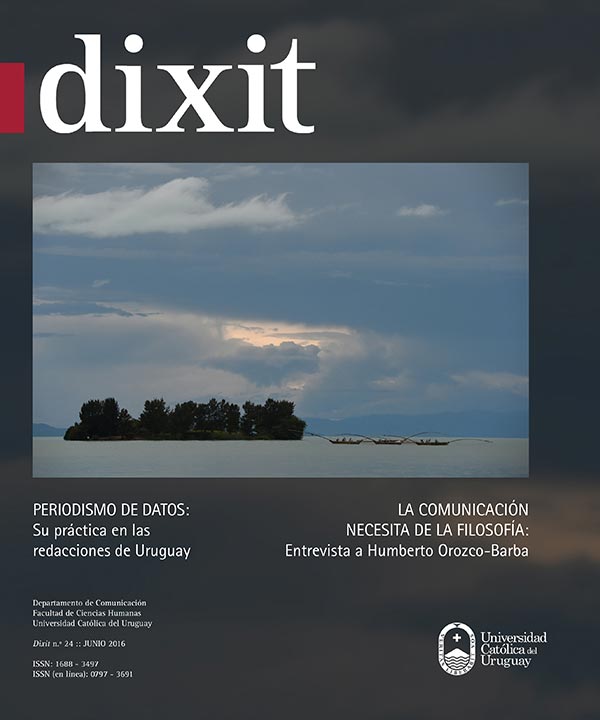Rock of the Eighties in Society: Meeting and Clash of Two Generations
DOI:
https://doi.org/10.22235/d.v0i24.1169Keywords:
Uruguayan rock, Eighties, democratic transition, youth subculturesAbstract
In late 1987, Uruguayan rock reached its peak acceptance
in the audiences, becoming the representative movement of all youth culture during the post-dictatorship period. In that same year, Relaciones magazine put together a panel aiming to communicate to the broader public what the new youngsters had to say about themselves as a new generation, as well as what they were saying about the emergent culture of the Eighties. The dynamics of the discussion took an unexpected course: the public mostly composed by members who were youngsters during the Sixties and Seventies, finished up dominating the discussion while talking about themselves and making the youngsters become spectators. This article analyzes the chronicles and reviews about the event, and reflects on this meeting as an instance where two generations were defined in terms of their mutual recognition. The meeting enabled both generations to define themselves since the contact between them had been banned by the dictatorship.
Downloads
References
Achugar, H. (1992). La balsa de la medusa: ensayos sobre identidad, cultura y fin de siglo. Montevideo: Trilce.
Bayce, R. (1989). Cultura política uruguaya. Desde Batlle hasta 1988. Montevideo: Fundación de Cultura Universitaria.
Behares, L. (1989). Rock Eros y Rock Thanatos. Relaciones, 42, 4-5.
Carbone, A., Forlán Lamarque, R. (1987). Fuera de control. Montevideo: Forum.
Bonaldi, J. (1986, enero 4). El imperio contraataca. La Hora.
Bravo, L. (2013). Grupo “UNO”: neovanguardia iconoclasta (1982-1994). Montevideo: Biblioteca Nacional. Recuperado de http://www.bibna.gub.uy/innovaportal/v/32915/4/mecweb/mayo:-ediciones-de-uno?parentid=29757
Clarke, J., Hall, S., Jefferson, T., Roberts, B. (2003). Subcultures, cultures and class. Hall, S., Jefferson, T.(Eds.). Resistance through Rituals: Youth Subcultures in post-war Britain. Working Papers in Cultural Studies 7/8 (pp. 9-74). Birmingham: University of Birmingham – Routledge.
Couto, T. (1987). Érase una vez. Relaciones, 42, 5-6.
Chastagner, C. (2012). De la cultura rock. Buenos Aires: Paidós.
De Certeau, M. (1998). The practice of Everyday Life. Storey, J.(Ed.) Cultural Theory and Popular Culture (pp. 483-494). Cornwall: Prentice Hall
De Espada, R. (1991). La producción cultural uruguaya de cara al año 2000. Achugar, H.(Eed.) Cultura(s) y nación en el Uruguay de fin de siglo (pp. 191-208). Montevideo: FESUR - Logos.
Delbene, L. (2014). Ediciones de UNO: poesía en la resistencia y reactivaciones de la vanguardia. Delgado, L. (Ed.) Cuadernos de Historia, 13, 78-99.
Delbene, L., Gerolami, C. (2013). Ediciones de UNO: Estética fundacional para una generación resistente (1982 – 1994). Montevideo: Biblioteca Nacional. Recuperado de http://www.bibna.gub.uy/innovaportal/v/32915/4/mecweb/mayo:-ediciones-de-uno?parentid=29757
Delgado, L. (2014a). El rock son los padres: cultura juvenil en los ochenta montevideanos. Delgado, L. (Ed.) Comunicación y cultura en los ochenta. Cuadernos de Historia, 13, 115-133.
Delgado, L. (2014b). Rock uruguayo de los ochenta: la inesperada reinvención de las tradiciones. Dixit, 21, 4-19.
Delgado, L. (2015). La subcultura del punk rock montevideano en la crítica musical y cultural de los ochenta (1983-1987). Revista Afuera, 16. Recuperado de http://www.revistaafuera.com/articulo.php?id=329&nro=15
Erdélyi, L. (1987, octubre 7). Rock & Roll vs. sistema político. Jaque, p. 24.
Farachio, F. (2015). Relatoría sobre una polémica de rock en cinco semanarios uruguayos (1985-1987) [Trabajo Final de Grado]. Montevideo: Universidad Católica del Uruguay.
Forlán Lamarque, R. (1987, octubre 7). Somos bastante depresivos. Mesa redonda sobre cultura rock. Jaque, p. 25.
G.A.S (Generación Ausente y Solitaria). (1987). Montevideo: G.A.S.
Guinovart, R. (2014). Jaque: entre la ideología y el partido. Delgado, L. (Ed.) Comunicación y cultura en los ochenta. Cuadernos de Historia, 13, 19-34.
Lyotard, J. F. (2004). The postmodern condition: a report on knowledge. Drolet, M. (Ed.) The Postmodernism Reader: Foundational Texts (pp. 123-146). Londres y Nueva York: Routledge.
Maffessoli, M. (1990). El tiempo de las tribus. Barcelona: Icaria.
Marcus, G. (1993). Rastros de carmín: una historia secreta del siglo XX. Madrid: Anagrama.
Migdal, A. (1991). Formación de la opinión cultural. Achugar, H. (Ed.) Cultura(s) y nación en el Uruguay de fin de siglo (pp. 177-190). Montevideo: FESUR – Logos.
Muñoz, C. (1987). Caruchas raras por la calle. Relaciones, 42, 4.
Perelli, C., Rial, J. (1986). De mitos y memorias. La represión, el miedo y después… Montevideo: Banda Oriental.
Phillipov, M. (2006). Haunted by the Spirit of ’77: Punk Studies and the Persistence of Politics. Continuum. Journal of Communication & Cultural Studies, 20 (3), 383-393.
Pittaluga, J., Esmoris, M. (1987). Juventud, contracultura y cambio social en Montevideo (un panorama de preguntas en la reconstrucción de modelos técnicos). Participación, 7, 9-20.
Rodríguez, M. (2012). En la noche: el rock uruguayo postdictadura. Montevideo: Fin de Siglo.
Rompiendo estructuras con rock. (2015, octubre 7). Jaque, pp. 23-25.
Sempol, D., Aguiar, S. (2014). “Ser joven no es delito”: transición democrática, razzias y gerontocracia. Cuadernos de Historia, 13, 134-151.
Trigo, A. (1997). Rockeros y grafiteros: la construcción al sesgo de una antimemoria. Bergero, A., Reati, F. (Comps.) Memoria colectiva y políticas de olvido: Argentina y Uruguay, 1970- 1990 (pp. 305-334). Buenos Aires: Beatriz Viterbo.
Downloads
Published
How to Cite
Issue
Section
License
From issue number 32 onwards all contents are licensed under the Creative Commons Attribution 4.0 International License (CC BY 4.0).
Issues number 29-31 are licensed under the Creative Commons Attribution-NonCommercial 4.0 International License.
The contents corresponding to number 28 and earlier editions are under the Creative Commons Attribution-NonCommercial-ShareAlike 4.0 International License.


















